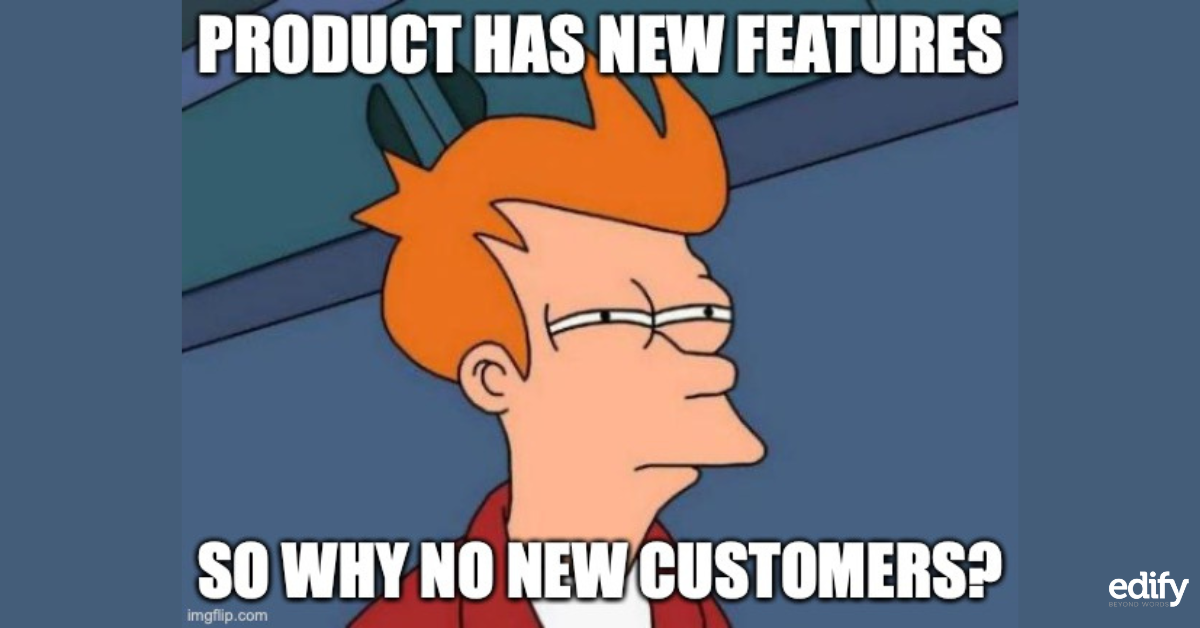Why Technical Gurus Need to Think Like Content Marketers
Here’s a joke for you:
Why couldn’t the developer market his startup?
Because his writing bytes.
I know, right?
But there is a kernel of truth hiding somewhere in my terrible joke: Technical whizzes don’t have to be fantastic marketers OR marketing writers themselves, but they need an appreciation for why marketing and writing skills are so important to their startup. And that requires a slight shift in thinking.
We work with a LOT of very technical-minded teams, and to a one, almost none of them understand the true value of marketing, let alone a content marketing strategy.
(Not that there’s anything wrong with that. Anthony explained blockchain to me at least three times and I still can’t confidently say that I understand what it is. Celebrate our differences!)
So I’m going to share how you, technical guru extraordinaire, can think just a bit more like a content marketer to lead your startup to success.
Think about the story
My sense of technical whizzes is that they approach things in very straightforward terms: There is a problem and I will solve it with technology. It will work and people will want it.
Instead, take a step back. Good marketing is about a story. Remember the 5 W’s and lone H around telling a story? Who, what, where, when, why, and how. Here’s how a marketer might think about this:
Who
Who is having the problem? Who can solve the problem? Who else has a solution already?
What
What is the problem? What does this problem do to the lives of those experiencing it? What is the solution? What are the tangible benefits the solution provides?
Where
Where have those having the problem looked for a solution?
When
When did this problem arise? When will the solution have an impact? When will users see results?
Why
Why is this a problem? Why wasn’t there a solution before? Why did you solve it? Why is your solution better?
How
How does the problem affect the lives of those who experience it? How did you solve it? How does it compare to other solutions, or no solution at all?
People remember stories more than they remember straightforward facts or data. Stories evoke emotion and are more likely to be persuasive. This isn’t a “Once upon a startup” type story; it’s a tool for speaking to the pains people experience and showing them (not telling them) how your tool mitigates those pains.
You can also think of it this way:
Problem: People aren’t connecting with your product.
Solution: Connect with people via story, don’t just present features and data.
Think value, not features
You must think of your product from a value standpoint, not a feature standpoint.
I have a whole post on how to explain your product and compel people to buy. That involves feeling the pain your target audience feels and then connecting how your product eases those pains. You should read it.
I meet many tech whizzes that take the problem-solution approach to marketing. “We have these features, ergo everyone will see their problem will be solved.” It seems clear.
It’s not.
If I tell you, “I have a machine that slices meat to a mere millimeter in thickness,” you might think, “That’s nice,” and be on your way.
You might see that people cannot slice their meat into thin, consistent slices and say, “My machine will slice their meat into thin, consistent slices.”
To most people, that’s just not compelling. Instead:
Remind them of how painful it is that their dull knife cuts their fingers
Commiserate that their slices are lopsided
Lament the time they lose to manual slicing
Ask, “What if you didn’t have to go to the deli to get your meat sliced?” Let them ponder what they could do with their time if they could slice their meat perfectly at home. Evoke the good family bonding that results over a picnic of perfect, homemade sandwiches. Show them how loved their young child will feel pulling that perfect sandwich out of their school lunch box.
Those are all values. Never once did we ask them to consider slice thickness, blade sharpness, or slicing speed.
Consider what your audience cares about, not what you care about
Perhaps you’ve done a lot of data analysis around your product. You might know that slicing one’s own meat decreases plastic waste by 80%. Perhaps it lowers the chances of listeria contamination by 40%. (I am clearly making all this up as I go along.)
Is the box for your product going to say, “40% less chance of listeria!!”?
I hope not.
Not all data is useful or relevant.
Any good marketing manager will ask you to consider what your data means to your customers and help you reframe and ask some questions:
Do your customers actually care about plastic waste reduction, or is it just something you want to say?
Do your customers regularly consider the dangers of listeria when eating sliced meat, and if so, why?
Do your customers care more about convenience or quality?
I find that most founders and executives know what they want to say about their product, so that’s what ends up on website copy and sales sheets. This might work up until a point. But often, that point is reached quickly, and sales and leads stagnate.
Why? The marketing just doesn’t speak to what potential buyers care about.
Most marketers distill this entire point into “know your audience,” but it’s more than that. You have to take yourself out of your goals, out of your business, out of your product, and think about what your audience really cares about.
And that is really hard for most founders to do, even if they’ve been in the shoes of the people they are selling to!
While it’s important for product and marketing to work together, it’s also imperative to decouple your product brain and your marketing brain on occasion. This is why you hire someone to handle your marketing and content strategies: That person can act as a dispassionate third party who can help understand your audience and shape a strategy that’s not based on features and functionality.
This is the biggest misunderstanding of marketing that technical gurus think: That marketing is about content creation and keyword research and digital ads.
But it’s not.
Marketing is about selling your product in a methodical, meaningful way. We may not deploy code and patches and updates, but there is a method.
When to think like a tech founder and when not to
Being a tech founder is challenging and there are a million hard problems to solve. Marketers have their own hard problems to solve, too. They just use different skills and tools than you do.
Recall the saying, “When you have a hammer, everything looks like a nail.” As a tech guru, you have to appreciate that the hammer you use to solve tech problems is not the tool you need to tell people about your product.
Being a tech founder is an internal role. Being a marketer is an external role. When you act like a tech founder externally, no one will want to buy your product.


